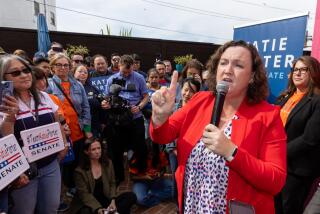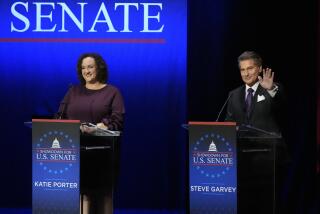Supporters to Attack 3 Charges in Peck’s Anti-Bork TV Ad as Blatant Distortions
- Share via
WASHINGTON — When the full Senate finally debates the Supreme Court nomination of Robert H. Bork later this week or early next, senators will spend much of their time debating the words of an unlikely figure--actor Gregory Peck.
It was Peck who narrated a controversial television advertisement that was a key component of the lobbying campaign against Bork, a campaign that President Reagan on Wednesday branded as one of “distortion and disinformation.”
In that 60-second advertisement, televised nationally at a cost of about $200,000, Peck charged that Bork “has a strange idea of what justice is. He defended poll taxes and literacy tests which kept many Americans from voting. He opposed the civil rights law that ended ‘whites only’ signs at lunch counters.”
Charges Called Distortions
Those three charges, according to Bork’s supporters, are three of the most blatant distortions of Bork’s record. Altogether, they have identified six major points on which they accuse Bork’s opposition of twisting the record to suit its purpose.
On two of the points, including Bork’s stand on literacy tests, his supporters appear to have a strong case. But on two others--poll taxes and the 1964 Civil Rights Act--the record appears strongly to support the charges against Bork. On two other allegations, the evidence is mixed.
Peck’s advertisement is sure to receive special attention in the Senate. Officials of People for the American Way, the ad’s sponsor, say they are confident it will pass scrutiny.
Their biggest problem involves Bork’s position on literacy tests.
In 1965, Congress prohibited states from requiring people to pass reading and writing tests before registering to vote. The high court in 1959 had ruled that such tests did not automatically violate the Constitution, but in 1966 the court upheld Congress’ power to ban the practice.
Bork said in congressional testimony in 1982 that Congress’ action exceeded its power and the court decision upholding that action was “very bad, indeed pernicious, constitutional law.”
Did that amount to defending literacy tests, as the ad charged? Melanne Verveer, People for the American Way’s director of public policy, said it did, because Bork opposed the way Congress acted to end the tests. But, she conceded, Bork never directly spoke out in favor of the tests.
On poll taxes, however, the charge against Bork has considerably more evidence behind it.
Bork, in congressional testimony in 1973, clearly disagreed with the high court’s 1966 decision eliminating poll taxes. The Virginia tax challenged in the case “was a very small poll tax,” he said. “I doubt that it had much impact on the welfare of the nation one way or the other.”
What upsets Bork’s supporters, said Sen. Alan K. Simpson (R-Wyo.), is the suggestion in the People for the American Way ad that Bork’s position constituted “racism.” The Virginia case “had nothing to do with race,” Simpson said.
The challenged advertisement, however, never mentioned race. It said only that the tax “kept many Americans from voting.”
The advertisement’s third charge--that Bork opposed the 1964 Civil Rights Act, which ended segregated public accommodations--accurately reflects a position Bork took at the time. Bork’s supporters argue that the charge distorts Bork’s view because he later changed his mind.
Three other issues not mentioned in the Peck advertisement have also been frequent targets for Bork’s allies. On two of those questions--a controversial decision Bork wrote as a judge on the federal appeals court in Washington and his role in the Watergate scandal--the evidence remains inconclusive.
In 1984, Bork, joined by two other judges, wrote an opinion upholding the right of American Cyanamid, a chemical company, to tell female workers in one of its factories that they must either be sterilized or lose their jobs because high levels of lead in the factory air could cause birth defects. Sen. Howard M. Metzenbaum (D-Ohio), one of Bork’s main opponents, said during Bork’s hearings that the decision was “shocking.”
Simpson and other Bork defenders say that Bork had no choice in his ruling because the company had no way to solve its lead problem. A federal safety official who reviewed the case before it reached Bork’s court took the same position.
But officials at the federal Labor Department and the union representing the women argued that the court could have directed the company to spend more money on safety. Evidence exists on both sides of that question.
On Watergate, the evidence on Bork’s actions is similarly inconclusive. The major question is how quickly he moved to find a new special prosecutor after firing Archibald Cox. Some witnesses, including Bork himself, say he acted “immediately.” Other witnesses say Bork acted only in the face of mounting public protest.
On one final issue, Bork’s supporters have a relatively clear case. Metzenbaum repeatedly challenged Bork’s views of antitrust law, saying they would lead to higher prices for consumers. Bork disagrees, and most specialists accept Bork’s position.
Bork’s supporters insist that their emphasis on the distortions in Bork’s record will pay off. Sen. John C. Danforth (R-Mo.), a Bork supporter who studied under Bork at Yale Law School, told reporters Wednesday that “the American people were frightened . . . because of the way Bork was characterized” by his opponents. Voters “will react against that,” he predicted, if Bork’s supporters can show he was smeared in the lobbying campaign against him.
Foes Defend Charges
Bork’s opponents not only defend the charges they leveled against the nominee but insist that pro-Bork forces have themselves resorted to exaggerations and underhanded tactics.
Bork supporters concede the point. A pro-Bork ad leveling personal allegations against four anti-Bork senators “cost us three votes,” Bork supporter Orrin G. Hatch (R-Utah) said Wednesday. The ad was sponsored by We the People, a Los Angeles-based pro-Bork group founded by Republican political consultant Bill Roberts, who could not be reached for comment.
More to Read
Get the L.A. Times Politics newsletter
Deeply reported insights into legislation, politics and policy from Sacramento, Washington and beyond. In your inbox twice per week.
You may occasionally receive promotional content from the Los Angeles Times.











